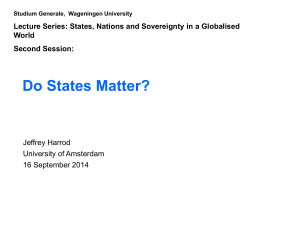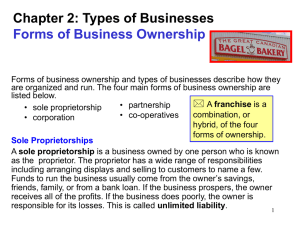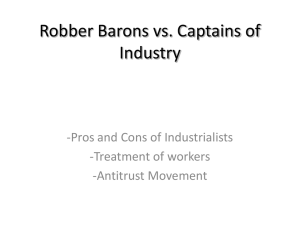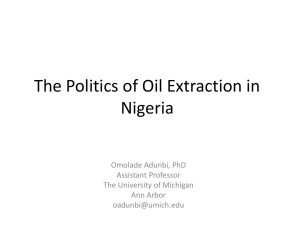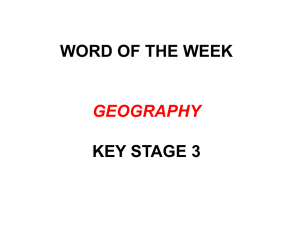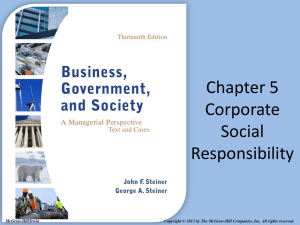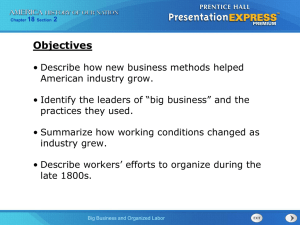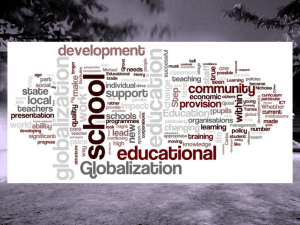Do States Matter?
advertisement
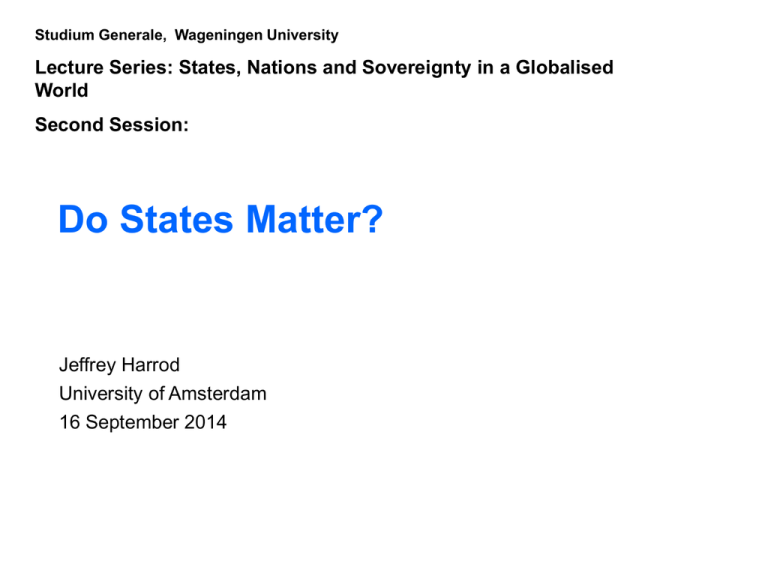
Studium Generale, Wageningen University Lecture Series: States, Nations and Sovereignty in a Globalised World Second Session: Do States Matter? Jeffrey Harrod University of Amsterdam 16 September 2014 DO STATES MATTER? Introduction the lecturer the lecture – part 1 – the states and their relations part 2 – corporations and other sub-state organisations Basic Arguments 1) Yes, states matter and more than ever but not as they did in the 19 and 20th centuries 2) the 21st century begins as a period of neo-imperialism 3) so-called “non-state actors” - corporations, international non-governmental organisations , rich individuals - are part of the new dynamics and structure of global relations. 4) the new role of the state is to interact with the new players in a regulating, assessing and monitoring role. The States Today There are between 189 and 196 independent countries/states in the world today. So, human beings divide themselves into distinguishable units based on: Ethnicity - distinguished by ethnicity (language, race, culture) Religion – distinguished by religion Civic – distinguished by values, governance Ideological – distinguished by a formal ideology What are the collective/elite motivations of these units? Three Modes of Operation Imperialism One unit seeks to exploit another through territorial expansion, economic extraction (finance, labour, resources); - leads to: military invasion and/or politico-economic intrusion Security/belonginess to be able to live a life with the expectation of stability and peace and free from perceived foreign domination/ to satisfy the sense of belonging to a unit; – leads to: military preparedness, unit-based cohesion Cooperation Cooperation between units for common interests; – leads to:international organisations, agreements, negotiations What are the connections between these units? THE FIVE GREAT TRANSACTIONS People - migration, refugees Goods - trade in manufactures, raw materials, food Money – investment, loans, transfers War – military invasion, occupation and domination Ideas/advocacy – religious and civic organisations How Important Are These Transactions? People – not so important as usually stated - International Migration report 2013 = 232 Million - United Nations High Commission for Refugees = 10.4 million - World Population 2013 7.2 billion 3.2 percent of world population live outside of their country of birth Trade – important for some not others - trade dependent countries – eg Germany, mono export countries of Global South - Less trade dependent – USA , Japan , - Energy dependent countries , Japan, Germany, China? India? Trade in energy at the core of international politics Money - Investment (FDI) – the sectoral power game - multinational investment mainly between rich countries - most sectors controlled by 4-7 large corporations - economic advantages versus political problems Multinational corporation investment as extension of state power Money – - the power of creditors - financial transactions only real material indication of globalisation - IMF as debt collector - debt as means of extraction Finance and debt involves external manipulation of internal politics Who Controls these Transactions ? The State until mid 20th century - the imperial mode - migration - trade and investment– tariffs, quotas bans, imperial corporations - finance – currency manipulation and controls The States from the mid-20th century - cooperative /security mode - end of direct colonialisation - rise of USA as dominant state/economy - creation of inter-state organisations – UN Agencies, Regional Groups - rise of corporate power The State and Corporation in 21 Century - the neo-imperial mode - multinational corporations hold 95% of global foreign investment and control 75% world trade - transnational banks control 70% of national sovereign debt Where do Multinational Corporations Come From? Usually large corporations with foreign branches therefore usually from large economies Country No. of MNC’s in Top 500 2012 Percent of Global Stock of investment USA 173 22 Japan 36 4.5 Germany 19 6.8 UK 38 4.5 China 10 1.7 Other BRICs 10-12 1.7 Where Do USA Corporations Invest? Source: U.S. Bureau of Economic Analysis: K. B. Barefoot and M. Ibarra-Caton “Direct Investment Position for 2009: Country and Industry Detail” July 2012, p19 How Can the corporation Challenge the State ? Basics of Corporate Power - the nature of the sector – natural resources, socially strategic - need for investment and technology transfer – Global South and development - weakness of governing elites – acceptance or rewards - promotion of values and culture – mass persuasion How Corporate Power has Increased - 20 years of concentration – global sectors now almost all oligopoly - the IMF, World Bank,WTO promotion of corporate-friendly investment climates - merger of corporate and business elites in headquarter countries - legitimization of activities of rich individuals – Gates, Soros, Trump etc Multinational corporate power now faces greater opposition How Can the State Respond ? - Use of internal political mobilization - control for security, environment, national interest - nationalisation of foreign assets - threat of debt defaults Recent examples Bolivia – water and Bechtel Argentina – oil and Repsol…. Venezuela – cement corporations India – Gujarat and power corporations Sweden - Dole Main resistance to corporate power is from the global south Are International Non-Governmental Organisations a Counter-Force ? - two sides of international civic organisations – - support of hegemony organization cements presence, values and practices of country of origin - help with opposition organization works with local population to control activiies of foreign corporations and banks - most ingo’s limited in funds budget of Greenpeace $150 million Budget of Shell $450 billion Global Union Federations - limited to publicity by sector - churches as INGO’s religious values and ideas and politics - Pentacostal churches in Brazil - increase in criminal non-governmental organisations through drugs networks Ingo’s do not constitute yet a counterforce but some begin to impact •Conclusion and personal note •The diversity of peoples and places in the world prevents any long-tem harmonisation and uniformity. •The core of imperialism and colonialism was the forced import of people goods , finance and institutions which and who were formed or constructed for another place. •This produced “imperial dysfunction” - when something imported does not “fit”, perform, or work properly in the new circumstance and produces stress, rejection and conflict. Neo-imperialism suffers the same dynamic. •The conflict will be resolved by resort to a new form of state. •Globalisation is the ideology of corporate power and as it fails it will be replaced by cooperation based on inter-state arrangements, coalitions and organisations which recognise, respect and work with diversity •The period of dominant globalisation will however leave behind networks and practices which will be positive in the reconstruction of a more peaceful, just and environmentally sustainable world. •But only if we work at it.
